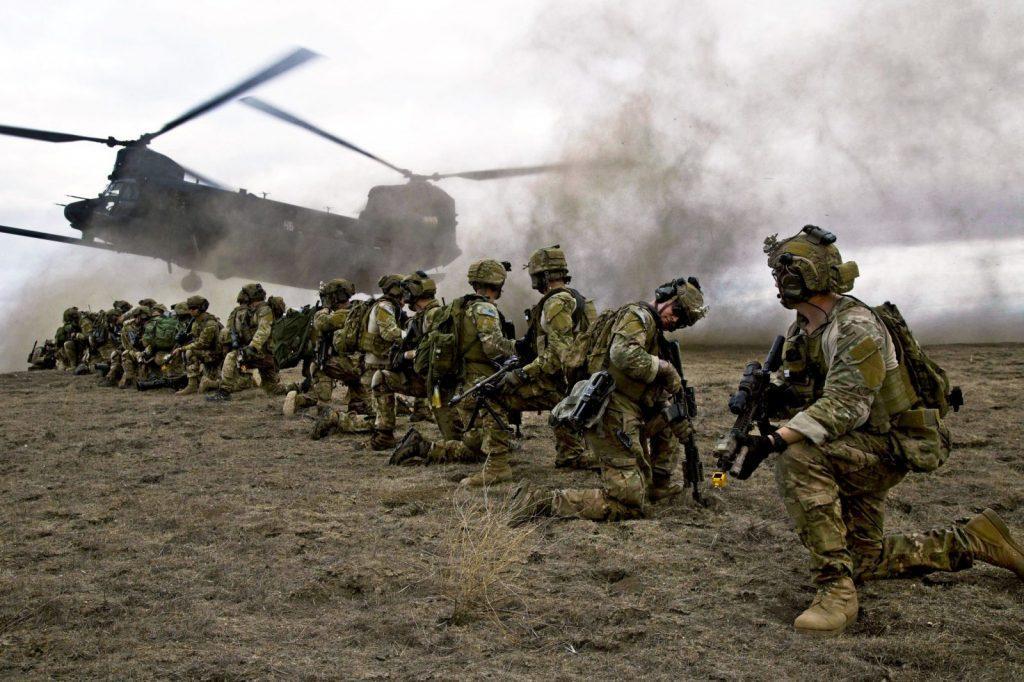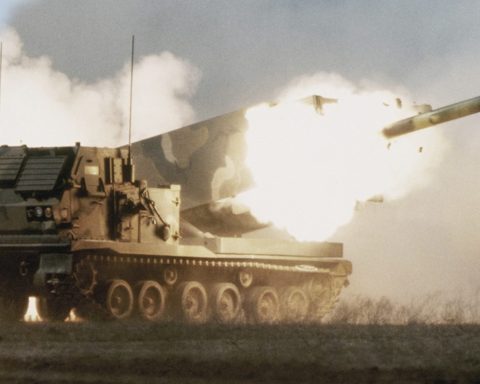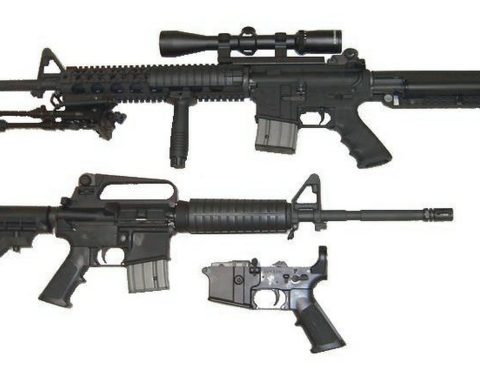There can be some confusion about US Army Rangers, because there are, in a way, two different types. There are those Soldiers who have completed the US Army Ranger School, and there are Soldiers who have served in the 75th Ranger Regiment.
United States Army Ranger School
“The United States Army Ranger School is an intense 61-day combat leadership course oriented toward small-unit tactics. It has been called the “toughest combat course in the United States” and “is the most physically and mentally demanding leadership school the Army has to offer”. It is open to soldiers (commissioned officer, warrant officer, or enlisted), sailors, airmen, and Marines in the US Armed Forces, as well as allied military students.
“The United States Army Ranger School is not organizationally affiliated with the 75th Ranger Regiment. Ranger School falls under the control of the United States Army Training and Doctrine Command as a school open to most members of the United States Army, but the 75th Ranger Regiment is a Special Operations warfighting unit organized under the United States Army Special Operations Command. The two share a common heritage and subordinate battalions common lineage, and Ranger School is a requirement for all officers and NCOs of the 75th Ranger Regiment. Those graduating from Ranger School are presented with the Ranger Tab, which is worn on the upper shoulder of the left sleeve of a military uniform, according to U.S. Army regulations. Wearing the tab is permitted for the remainder of a soldier’s military career. The cloth version of the tab is worn on the Army Combat Uniform and Class-A dress uniform of the U.S. Army; a smaller, metal version is worn on the new Army Service Uniform.

“The purpose of the course is learning to soldier as a combat leader while enduring the great mental and psychological stresses and physical fatigue of combat; the Ranger Instructors (RIs) – also known as Lane Graders – create and cultivate such a physical and mental environment. The course primarily comprises fieldcraft instruction; students plan and execute daily patrolling, perform reconnaissance, ambushes, and raids against dispersed targets, followed by stealthy movement to a new patrol base to plan the next mission. Ranger students conduct about 20 hours of training per day while consuming two or fewer meals daily totaling about 2,200calories (9,200 kJ), with an average of 3.5 hours of sleep a day. Students sleep more before a parachute jump for safety considerations. Ranger students typically wear and carry some 65–90 pounds (29–41 kg) of weapons, equipment, and training ammunition while patrolling more than 200 miles (320 km) throughout the course.”
The U.S. Army Rangers aren’t Special Operations Forces
The short and sweet answer is that U.S. Army Rangers aren’t considered Special Forces because Rangers aren’t Special Forces. Neither are Navy SEALs or MARSOC Raiders for that matter. Far too often, Special Forces are used as a catch-all term for any and all Special Operations Forces (SOF). This application of the term is a misnomer as Special Forces (within the context of the U.S. military) is a specific reference to U.S. Army Special Forces, a.k.a the Green Berets. So because Rangers aren’t “special forces” because they aren’t Green Berets. Think of it this way – everyone in Special Forces is a member of the SOF community, but not everyone in the SOF community is Special Forces.
With all that out of the way, the U.S. Army Rangers are considered part of the SOF community – they are under the jurisdiction USSOCOM and USASOC. However, to your point, they don’t have quite the same mystique as Green Berets or Delta Force.
I would argue that a big part of this has to do with public misconceptions about all three of the aforementioned units. Here’s the thing: Army SOF units are not mutually exclusive. In all likelihood, your average D-Boy has been a Ranger or Green Beret at some point in his career before trying out for Delta. In fact, this is encouraged as serving in either the Rangers or Special Forces allows a would-be Delta operator to gain valuable combat experience and develop a strong foundation of infantry and small unit tactics. So it’s not that Rangers aren’t “as good” as the other two units – it’s just that they’re often younger, less-experienced, and maybe in the process of building the skill sets they need in order to become Green Berets or Delta Force operators.
“The 75th Ranger Regiment, also known as Rangers, is light infantry, special operations unit of the United States Army. The regiment is headquartered at Fort Benning, Georgia and is composed of one special troop’s battalion and three ranger battalions. The regiment is the U.S. Army’s premier raid force, with specialized skills that enable them to perform a variety of missions. These include direct action, airfield seizure, airborne and air assaults, special reconnaissance, personnel recovery, and high-value target raids. It operates as a special operations forces under the United States Army Special Operations Command.” —Wikipedia, 75th Ranger Regiment
The 75th Ranger Regiment is a Special Operations Force, but they are not considered Special Forces because that term in the United States Army refers to units with a different, and specific purpose that perform other missions besides those of the Ranger Regiment.
“The United States Army Special Forces, known as the Green Berets because of their distinctive service headgear, are a special operations force tasked with five primary missions: unconventional warfare (the original and most important mission of Special Forces), foreign internal defense, special reconnaissance, direct action, and counter-terrorism. The first two emphasize language, cultural, and training skills in working with foreign troops. Other duties include combat search and rescue (CSAR), counter-narcotics, counter-proliferation, hostage rescue, humanitarian assistance, humanitarian demining, information operations, peacekeeping, psychological operations, security assistance, and manhunts; other components of the United States Special Operations Command (USSOCOM) or other U.S. government activities may also specialize in these secondary areas.” —Wikipedia, Special Forces (United States Army)
Delta/CAG/whatever they’ve changed their name to this week for OPSEC purposes are an outgrowth of Special Forces and are technically a Special Forces unit.
The confusion here is mostly one of semantics. The 75th Ranger Regiment, Army Special Forces, and Delta/CAG/whatever all are Special Operations Forces units that conduct Special Operations missions, but they perform different types of missions.
The Ranger Regiment is the “big stick” of the Special Operations community and is tasked primarily with Direct Action missions—shooting bad guys and breaking or stealing their stuff or territory.
Army Special Forces perform a lot of different missions beyond just Direct Action stuff. They go into an unfriendly country and raise insurgent movements, they go into friendly countries and train their militaries and police to do their jobs better, they conduct special recon missions deep in the unfriendly territory when you can’t get intelligence with just ELINT/SIGINT/MASTINT, they go into humanitarian disaster areas that might be too dangerous for traditional Humanitarian Aid workers to get recovery operations started. They take on the complex, head-scratching missions.
Delta/CAG/XYZ is a Tier One unit. They perform the most crucial Special Operations missions that the Army has, whether it’s Direct Action, or whatever. If you have a SOF mission and it’s assigned to the Army, and it absolutely must produce results, it will be tasked to Delta. They can ask for just about any sort of training, equipment, and educational resources they need because their mission could encompass just about anything.









When discussing ‘Special Forces’ in the US military, there is BUT ONE such unit and that is the Green Berets of the US Army. No others are authorized the wearing of such title! Others may be designated as Special Operations Forces, but NOT Special Forces.
While the descriptions above are very in depth, I disagree with the answers to the two main questions. In title, the 75th (US) Infantry Regiment (Ranger) isn’t a Special Forces unit because the military terminology defines the Special Forces as being exclusive to the Special Forces Groups. Delta/CAG is included in the definition while being exclusive itself as it was a Special Forces Unit (Special Forces Operational Detachment Delta). However, the Ranger Regt is a member of the country’s Special Operations Forces as a unit assigned unique Special Operations Missions. The Regiment is not a Tier 1 unit, although a unit within the Rangers, The Ranger Reconnaissance Company is a Tier 1 Unit. It comes down to what is a name? The Ranger Regiment has a different mission profile than CAG or SFGs. The are an elite force just like the 160 Special Operations Aviation Regiment. So the real question is, regarding the first question above, are you looking at a title or a mission profile?
Sir/Ma’am:
Rangers have an elite mission.
Have иice day.
As said, there’s only 2 true Tier1 units in the US military, SEAL 6, & Army Delta force. All the others such as Rangers, SEAL teams except 6 & 3. are damn good soldiers, and they’re light infantry units. In the U.K our Tier1 units are 22 SAS, SBS & SRR (special reconnaissance regiment). The SRR & the CIAs secret army work together, like Delta & 22SAS or SEAL team 6 & SBS. These units can’t be graded as they work lethally together, as do SRR & CIA. But there’ll be COD boys & those Stolen valour morons claiming differently.
Ok this is about titles lmao. With Soldiers saying what’s what. Please get the fuck on
Interesting discussion. Everyone likes to be at the “top” of the food chain, but really, it’s not so much about who is better, it’s about scope. Different units have different taskings, and different specialty training.
In Canada JTF is Tier 1. CSOR is Tier 2/3…ish. But, they can work together on the same mission, with different mission scopes and taskings.
I guess I do understand why people want to be ranked, I just get turned off when it turns into a dick measuring contest.
All who served with honor, deserve to be honored.